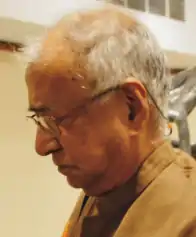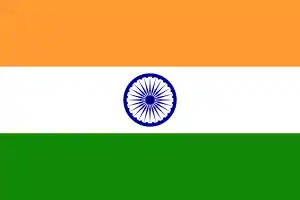K. G. Subramanyan
Kalpathi Ganpathi "K.G." Subramanyan (1924 – 29 June 2016) was an Indian artist. He was awarded the Padma Vibhushan in 2012.[4]
K. G. Subramanyan | |
|---|---|
 K.G. Subramanyan 2008. | |
| Born | 1924[1] Kuthuparamba, Kerala, India |
| Died | 29 June 2016 (aged 92)[2] |
| Education | Visva-Bharati University |
| Alma mater | Visva-Bharati University |
| Occupation | Painter, sculptor, muralist, printmaker, writer, academic |
| Movement | Contextual Modernism, Baroda Group[3] |
| Awards | Padma Shree, Kalidas Samman, Padma Bhushan, Padma Vibhushan |
Life
Subramanyan was born in 1924 in Kuthuparamba[5][6] in Kerala, India,[7] and initially studied economics at Presidency College, Madras.[7] During the freedom struggle he was actively involved and was known for his Gandhian ideology. He was even imprisoned and later banned from joining government colleges during the British Rule. The turning point of his life, as an artist, came when he visited Santiniketan to study in Kala Bhavan, the art faculty of Visva Bharati University, in the year 1944. Under the tutelage of such pioneers of modern Indian art as Nandalal Bose, Benode Behari Mukherjee and Ramkinkar Baij, Subramanyan studied there till 1948.
In 1951 he became a lecturer at the Faculty of Fine Arts in M.S. University in Baroda. He went to study briefly in London at the Slade School of Art as a British Council scholar in 1956. While having already gone back to Baroda as a professor in painting and continuing there, he did a short stint in New York as a Rockefeller Fellow in 1966.[8] In 1980, Subramanyan went back to Santiniketan to teach in his alma mater Kala Bhavan, Visva Bharati University, in his capacity as a professor in painting, which he continued till he retired in 1989. In the same year, he was made a Professor Emeritus of Visva Bharati.
Subramanyan resided in Baroda, with his daughter Uma, towards the later days of his life and it was here that he died on 29 June 2016.[2]
Artistic styles and Influences
K.G. Subramanyan was greatly influenced by folk art from Kerala, Kalighat painting and Pattachitra from Bengal and Odisha, as well as Indian court paintings.
Retrospective show
There have been numerous retrospective shows of K.G. Subramanyan. K.G. Subramanyan, a Retrospective was the fourth and largest, curated by R. Siva Kumar at the National Gallery of Modern Art.[9]
Career
From 1951 to 59 Mr. Subramanyan was the Lecturer in Painting, Faculty of Fine Arts, Baroda. He was the British Council Research Scholar, UK from 1955–56. He was Deputy Director (design), All India Handloom Board, Bombay from 1959 to 61 and Reader in Painting, Faculty of Fine Arts, Baroda from 1961 to 65.
- 1966–80 Professor of Painting, Faculty of Fine Arts, Baroda
- 1961–66 Design Consultant, All India
- 1966–67 Fellowship of The JDR III Fund, New York
- 1968–74 Dean, Faculty of Fine Arts, Baroda
- 1975 Elected to the World Crafts Council
- Delegate, Asian Assembly, World Craft Council, Sydney
- 1976 Member delegate, General Assembly, World Craft Council, Oaxtepec, Mexico
- Visiting lecturer, Canadian universities: Montreal, Ottawa, Hamilton
- 1977–78 Visiting Fellow, Kala Bhavan, Visva Bharati, Santiniketan
- 1980–89 Professor of Painting, Kala Bhavan, Visva Bharati, Santiniketan
- 1985 Guest, Chinese Artists Association, China
- 1987–88 Christensen Fellow, St. Catherine’s College, Oxford
- 1989 Professor Emeritus, Kala Bhavan, Visva Bharati, Santiniketan
- 2004 Left Santiniketan and shifted back to Baroda in September.
Honours and awards
_Saraswat_award.jpg.webp)
- 1963: Medallion of Honourable Mention, Sao Paulo Biennale, Brazil
- 1965: National Award, Lalit Kala Akademi
- 1968: Gold Medal, The First International Triennale, New Delhi
- 1975: Padma Shri, Government of India[10]
- 1991: Gagan-Aban Puraskar, Visva-Bharati University, Santiniketan
- 1992: D.Litt. (Honoris Causa), Rabindra Bharati University, Calcutta
- 2006: Awarded Padma Bhushan by the Government of India[10]
- 2009: Awarded Dishikottam, Visva-Bharati University, Santiniketan
- 2011: Awarded D.Litt. (Honoris Causa), Assam University, Silchar.
- 2012: Awarded the Padma Vibhushan by the Government of India[10]
- 2015: Awarded the Dhirubhai Thakar Savyasachi Saraswat Award[11]
Memberships and associations
- 1961–67 All India Board of Technical Studies in Applied Art
- 1961–65 Gujarat Lalit Kala Akademi
- 1967–79 Lalit Kala Akademi
- 1968–74 Gujarat Lalit Kala Akademi
- 1974–78 Member of the Governing Council, National Institute of Design, Ahmedabad
- 1981–84 Member Siksha-samiti and Karma-samiti of Visva Bharati, Santiniketan
- 1981–84 Member of the All India Handloom and Handicrafts Board
He has also been on the Board of studies of M.S. University, Baroda; Benaras Hindu University, Benaras; Punjab University, Chandigarh; College of Fine Arts, Trivadrum, Kerala; Faculty of Fine Arts, Bombay University; Rabindra Bharati University, Calcutta etc. and a member of the Editorial advisory Board of Leonardo.
Books
- 1978 Moving Focus: Essays on Indian Art, Lalit Kala Akademi, New Delhi. (Reissued by Seagull Books, Calcutta in 2006)
- 1987 The Living Tradition, Seagull Books, Calcutta
- 1992 The Creative Circuit, Seagull Books, Calcutta
- 2006 Translation of Benodebehari Mukherjee’s Chitrakar, Seagull Books, Calcutta
- 2007 Poems, Seagull Books, Calcutta
- 2007 The Magic of Making: Essays on Art and Culture, Seagull Books, Calcutta
Illustrated books
- 1969 When God First Made the Animals He Made Them All Alike
- 1972 The Butterfly and the Cricket, A Summer Story, Robby
- 1974 Our Friends the Ogres, The King and the Little Man
- 1979 How Poppy Grew happy, Cat’s Night and Day, Frog Life is Fun Life
- 1985 Of Ogres Beasts and Men (When God First Made the Animals He Made Them All Alike, Our Friends the Ogres, and The King and the Little Man reissued as a boxed set)
- 1995 How Hanu Became Hanuman, Death in Eden, In the Zoo (All three reissued in 1996)
- 1998 The Tale of the Talking Face
Murals
- 1955 Jyoti Ltd., Baroda Faculty of Fine Arts, Baroda
- 1963 ‘King of the Dark Chamber’, Rabindralaya, Lucknow
- 1965 India Pavilion, New York World Fair, New York
- 1969 ‘India of my Dreams Pavilion’, Gandhi Darshan, New Delhi
- 1976 R & D Building, Jyoti Pvt. Ltd., Baroda
- 1988 Sand cast Cement Mural, Kala Bhavan, Santiniketan
- 1989 Reverse painting on Glass Mural (with school children), Santiniketan
- 1990 Black and White Mural, Kala Bhavana, Santiniketan (first phase)
- 1993 Black and White Mural, Kala Bhavana, Santiniketan (second phase)
- 2009 Black and White Mural, Kala Bhavana, Santiniketan (2nd version)
Students
Some of his students were Bhupen Khakhar, Ghulam Rasool Santosh, Gulam Mohammed Sheikh, Haku Shah, Jayant Parikh, Jyoti Bhatt, Jyotsna Bhatt, Laxma Goud, Mrinalini Mukherjee, Nilima Sheikh, Rajeev Lochan, Ratan Parimoo, Rekha Rodwittiya, Shanti Dave, Thota Vaikuntam, Vivan Sundaram.
See also
 Biography portal
Biography portal India portal
India portal Art portal
Art portal
References
- Tuli, N. (2004). Masterpieces & museum quality III: Indian contemporary paintings with rare books & vintage film memorabilia. OSIAN's. ISBN 9781890206703. Retrieved 9 March 2017.
- "Modern art pioneer KG Subramanyan, 92, passes away in Vadodara on 29 June". First Post. 29 June 2016. Retrieved 29 June 2016.
- "His name is listed as Baroda Group of Artists' fifth annual exhibition of paintings by". Asia Art Archive.
- "Padma Awards". pib. 27 January 2013. Retrieved 27 January 2013.
- Tuli, N. (2002). Masterpieces and museum-quality Indian modern & contemporary paintings. Osian's. ISBN 9788190124751. Retrieved 9 March 2017.
- Subramanyan, K.G. (1999). Sketches, Scribbles, Drawings. Seagull Books. ISBN 9788170461500. Retrieved 9 March 2017.
- "K.G. Subramanyam". contemporaryindianart.com. Archived from the original on 18 October 2013. Retrieved 9 March 2017.
- "K. G. Subramanyam". contemporaryindianart.com. Archived from the original on 18 October 2013. Retrieved 9 March 2017.
- "The quintessential Indian artist". frontline.in. Retrieved 9 March 2017.
- "Padma Awards" (PDF). Ministry of Home Affairs, Government of India. 2015. Archived from the original (PDF) on 15 October 2015. Retrieved 21 July 2015.
- "K G Subramanyan awarded Savyasachi Award". The Times of India. 28 June 2015. Retrieved 15 July 2010.
External links
- K G Subramanyan Paintings
- "K G Subramanyan Profile,Interview and Artworks"
- 20th Century Museum of Contemporary Indian Art
- Subramanyan on "Artnet"
- The Quintessential Indian Artist" "Frontline"
- Centre for International Modern Art
- K. G. Subramanyan video at Web of Stories
- Children's books by K G Subramanyan
- K. G. Subramanyan : Artist Profile and Artworks on 'Artisera'